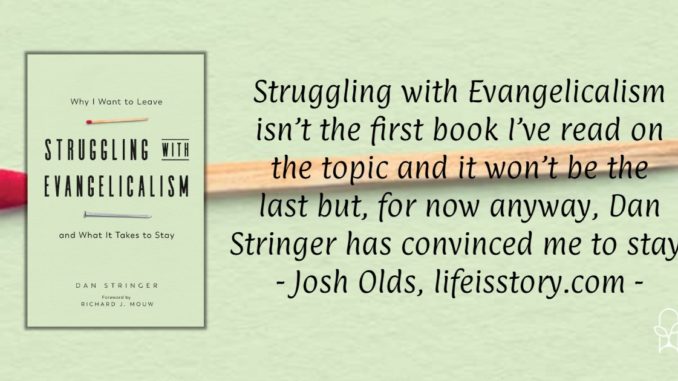
Published by IVP on November 2, 2021
Genres: Non-Fiction, Christian Life
Buy on Amazon
Goodreads

When evangelicals make a mess, who cleans it up? Many today are discarding the evangelical label, even if they still hold to the historic tenets of evangelicalism. But evangelicalism is a space, not just a brand, and living in that space is complicated. As a lifelong evangelical who happens to be a biracial Asian/White millennial, Dan Stringer has felt both included and alienated by the evangelical community and has wrestled with whether to stay or go. He sits as an uneasy evangelical insider with ties to many of evangelicalism's historic organizations and institutions. Neither everything's fine nor burn it all down, Stringer offers a thoughtful appreciation of evangelicalism's history, identity, and strengths, but also lament for its blind spots, toxic brokenness, and complicity with injustice. From this complicated space, we can move forward with informed vision rather than resignation and with hope for our future together.
I am a product of evangelicalism.
I was born into evangelicalism. Grew up in evangelicalism. Studied in evangelicalism. Ordained in evangelicalism. Taught in evangelicalism. And while the cracks in the foundation had made themselves known during that time, it all came undone with the election of Donald Trump as president. My struggle with evangelicalism went from a desire to correct and reform, repent and atone to wondering if the word I used for my faith was accurate anymore—or even if it had ever been accurate.
In the past half-decade, as I’ve studied evangelicalism’s past, protested its present, and worried about its future, I’ve debated whether or not I needed to leave the term evangelical behind me. Struggling with Evangelicalism isn’t the first book I’ve read on the topic and it won’t be the last but, for now anyway, Dan Stringer has convinced me to stay. To use the term. To reclaim it, redeem it, and repent from the way those using the term have treated others.
One that I wouldn’t want to do—and Struggling with Evangelicalism is with me on this—is pull a “No True Scotsman” and claim that anyone who has done harm in the name of evangelicalism aren’t really evangelicals. Stringer is clear that the foundations of evangelicalism are rooted in white cultural identity, colonialism, a defense of slavery and segregation, and other injustices that persist today in more subtle and systemic forms. Yet, there are evangelicals—theologically—that come from a different cultural background.
After introductory chapters that explain Stringer’s evangelical background, Struggling with Evangelicalism goes through four steps in the struggle: awareness, appreciation, repentance, and renewal. Each step gets two chapters, related in a conversational tone. Stringer puts a lot of himself into the book presenting himself not as someone who’s figured it all out but someone who is on the journey himself.
The chapters on awareness set about defining evangelicalism—borrowing from Du Mez’s Jesus and John Wayne—and detailing what denominations and faith streams fit within that definition. One of the most important parts of these chapters is understanding how the theological and cultural definitions of evangelicalism overlap, but are not identical. That is, it is possible to be an evangelical theologically but not culturally. Frankly, it’s this distinction (spurred on by a conversation I had with Ron Sider, author of The Spiritual Danger of Donald Trump) that’s kept me in the evangelical fold. The “evangelical left” offers safe haven for those whose theology remains evangelical but who cannot support the politicized nature of much of white American evangelicalism.
Second is appreciation. Stringer has the presence of mind to explain his decision in putting appreciation before repentance and renewal. Appreciating what good evangelicalism has done helps remind us that it’s worth the process of repentance and renewal. This appreciation of evangelicalism also extends outside of white American evangelicalism (which is only a small fraction of evangelicalism worldwide) to the global experience of evangelicalism. In this, Struggling with Evangelicalism is able to show that the commodified, politicized, white American cultural brand of evangelicalism is quite a small box within a larger tradition.
Third is repentance. While I do think Stringer could have (should have?) been harsher and blunter in his call for repentance, its irenic tone is probably more conducive to those sitting on the fence. He makes the case for communal repentance, even when there is no individual guilt and parses the difference between being guilty of and having responsibility for. It’s a more moderate tone than where I’m at, but it’s a start.
Last is renewal. Struggling with Evangelicalism holds out hope that there will be redemption and repentance and that it will bring renewal. Stringer points to areas within evangelicalism that have sought to make amends for the past and paints a hopeful picture amid the pain. In the end, I want to be convinced but…I’m not seeing it yet. Nonetheless, I’ll continue to refer to myself as evangelical in private, but the publicly I’m not convinced the term has value. The theological definition is just too consumed by the cultural one. So the struggle continues. It’s the same struggle we’ve seen throughout church history: does one stay within to reform or does one leave to revolt? For now, I’ll stay. But as long as I do, the revolution will be coming from inside the house.
